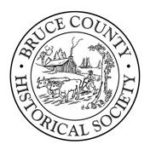
Mrs. Donalda McClure was a journalist from Chesley and a past-president of the Historical Society. She wrote about her recollections for its 1986 Yearbook. As we slowly emerge from the COVID-19 pandemic, it is interesting to consider how Bruce County residents once coped with a similar health crisis.
Soldiers were returning from World War One. Apparently, they brought back the influenza germ with them. Mrs. Amelia MacPherson (Herron) recounts how two of her brothers died in those first months. Along with her mother and another brother, she was isolated in the old British Hotel in Tara, turned into a makeshift isolation hospital. Common sounds during the epidemic were bells tolling in church belfries whenever a death was announced. The snow chains on the car of Dr. H.E. Morgan of Chesley could be heard clanking on the concession roads as he drove across Sullivan Twp.at all hours of winter nights.

By early December of 1918, the epidemic was assuming the proportions of a plague in the area. Social gatherings were cancelled; churches and schools were closed. I attended school only 18 days during the fall term. Those were prohibition days but many had stored liquor to be used as medicine. A neighbour credited Irish whiskey for his recovery. Other home-made cures were garlic, onions and swamp whiskey.
Kenneth Dawson was a young farm lad. Ambitious to be a doctor, he earned money in 1918-19 by working at a lumber camp in Northern Ontario where many men became sick with fevers and chills and died. He survived and eventually graduated from medical school. In 1927, he arrived in Chesley where he stayed for more than 50 years.
Funeral directors could not keep up with burying the dead in Chesley and throughout Sullivan and Elderslie Townships.
Ontario Provincial Public Health notice 1918 – For larger view, Click on Image
A Canadian National Railway train arrived from the west with 14 of its 17 sleeping-car passengers dead, including residents of Arran Twp. and Tara. Many ministers were ill or died. A Baptist pastor, Rev. Shultz of Shedden, conducted as many as three funerals a day, filling in for sick colleagues. Denominational barriers were forgotten.
In the 1980s, it is hard to imagine what it must have been like to cope with an unknown deadly disease without modern drugs.
——————————————
The original article was abridged by Bob Johnston












